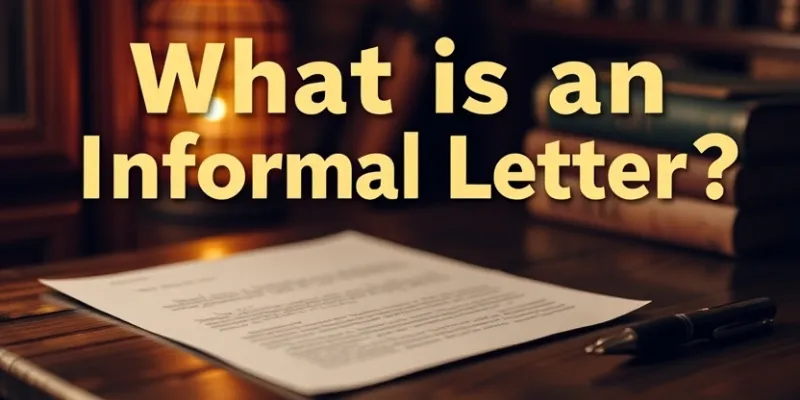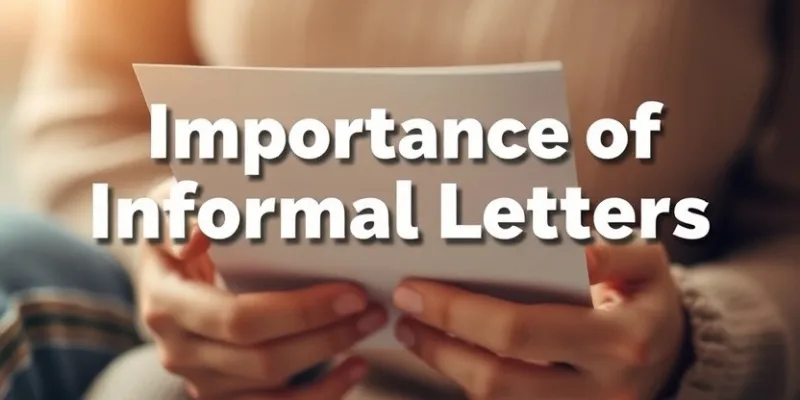What is an Informal Letter? Exploring Its Importance in Today’s Digital World
Published: 9 Nov 2024
Welcome to Our Guide on What is an Informal Letter!
Imagine this: It’s a rainy afternoon, and you’re sitting on your couch with a warm cup of hot chocolate. Suddenly, the doorbell rings. You rush to the door, and there it is—a letter just for you! It’s handwritten by your friend, and as you read it, you can hear their laughter in your mind. That’s the magic of an informal letter! In today’s world, we mostly send texts and emails, but getting a personal letter feels special, like finding a treasure chest filled with memories. Informal letters let us share our feelings, tell stories, and connect with our friends and family.
If you feel this way, you are not alone. The art of writing informal letters always matters. As the famous writer Leo Tolstoy said, “The two most powerful warriors are patience and time.”
In this article, we will explore what is an informal letter, why it is important, and how you can write a good informal letter. We will also discuss the importance of writing informal letters, the key features of an informal letter, and when to use them. Additionally, we’ll weigh the pros and cons of informal letters, look at their structure, and provide examples along with common mistakes to avoid.
Let’s begin this journey!
1. What is an Informal Letter?

An informal letter is a friendly note written to someone you know well, like a friend or family member. Unlike formal letters used for official purposes, informal letters have a relaxed and personal tone.
They allow you to share your thoughts, feelings, and stories in a way that feels genuine. You can start with a casual greeting like “Hi!” or “Hey there!” and write about anything that’s on your mind—whether it’s a funny story, exciting news, or just how your day went.
Informal letters help create a special connection with the reader, making them feel valued and included in your life. Writing one is a delightful way to express yourself and keep in touch with the people you care about!
2. Importance of Writing Informal Letters
In today’s fast-paced world, where texting and emailing have become the norm, writing informal letters still holds great value. These letters allow us to express our feelings and share experiences in a personal way.

When we take the time to write an informal letter, we show our friends and family that they matter to us. Informal letters can strengthen our bonds, as they are filled with warmth and affection. They create a special connection that digital messages often lack.
By writing these letters, we keep our relationships alive and vibrant, making each recipient feel valued and loved. So, putting pen to paper can bring joy not just to the reader but also to ourselves!
3. Key Features of Informal Letters – Connecting Through Personal Touch
Informal letters are a cherished way to connect with friends and family, allowing for creative expression and strengthening relationships. They enable us to share our feelings and experiences in a personal way, making each letter a unique reflection of our thoughts.

Here are some key features that make informal letters special and enjoyable to read:
- Casual Tone: Informal letters use a friendly and relaxed tone, letting the writer express themselves without strict rules.
- Personal Language: The language is often simple and familiar, filled with expressions, jokes, and everyday phrases, making it feel like a chat.
- Flexible Structure: There is no set length for informal letters; they can be short notes or longer letters, depending on what you want to share.
- Friendly Greetings: You can start with casual greetings like “Hey!” or “Hi there!” to create a warm atmosphere right from the beginning.
- Warm Sign-offs: Ending with a friendly closing like “Take care!” or “See you soon!” adds a personal touch to the letter.
4. When to Write Informal Letters: Special Moments to Consider
Informal letters are perfect for many special occasions! Here are some situations where you might want to write one:
- Sharing Personal News: Write to friends or family to share exciting updates about your life, like a new hobby, a fun trip, or even just how school is going. Your loved ones will enjoy hearing about your experiences and feeling included in your life. Personal news can be anything from acing a test to getting a new pet, and sharing these moments helps strengthen your relationships.
- Staying Connected: If you have loved ones who live far away, writing informal letters helps you stay connected and maintain those special bonds. You can share stories, ask about their lives, and make plans for future get-togethers, keeping your friendship strong even across distances. Sharing your day-to-day life helps them feel like they’re still a part of your world.
- For instance, when a loved one gets a new job, writing a letter to express your congratulations is a thoughtful gesture. If you’re unsure how to go about it, you can find a helpful guide on writing a congratulations letter to a sibling for a new job here.
5. Example of an Informal Letter: A Heartfelt Note to a Friend
Writing an informal letter can be a delightful way to connect with loved ones. Below is an example of an informal letter that showcases how to share personal news and maintain relationships. This letter highlights the warmth and friendliness typical of informal correspondence.
Date: 28th October 2024
From: Ananya Sharma
Address: 123, Green Park, New Delhi, India
To: Priya Kapoor
Address: 456, Blue Ridge, Mumbai, India
Dear Priya,
I hope this letter finds you in great spirits! It’s been a while since we last caught up, and I wanted to share some exciting news with you. I recently joined a new painting class, and I can’t wait to show you my artwork! It’s a lot of fun, and the teacher is really inspiring.
Do you remember our plans to visit the hill station together? I think we should finalize the dates soon. The weather is perfect for a getaway right now!
By the way, how is your new puppy doing? I can only imagine how adorable he must be! Please send me some pictures; I’d love to see him.
Take care and write back soon!
Warm regards,
Ananya

6. Pros of Informal Letters
Informal letters offer several advantages that make them a valuable form of communication:
| Advantages of Informal Letters |
|---|
|
7. Cons of Informal Letters
While informal letters have many disadvantages, it’s essential to be aware of them:
| Disadvantages of Informal Letters |
|---|
|
FAQs About Informal Letters
Informal letters are a cherished way to connect with friends and family. Here are some frequently asked questions to help you understand and write them better.
An informal letter is a personal message written to someone close, like a friend or family member, in a friendly and relaxed tone.
The purpose of an informal letter is to share personal news, thoughts, or experiences with someone you care about.
An informal letter usually starts with a casual greeting like “Dear [Name]” or “Hi [Name].”
The body should include stories, updates, or personal thoughts shared in a conversational and friendly way.
End an informal letter with a warm closing like “Take care,” “Best wishes,” or “Warm regards,” followed by your name.
Informal letters are casual and written in a personal tone, unlike formal letters, which are structured and professional.
Yes, adding doodles or decorations can make the letter more personal and fun for the recipient.
There aren’t strict rules, but keeping the tone friendly and ensuring clear communication is recommended.
They can be either handwritten or typed, but handwritten letters often feel more personal and special.
People write informal letters today to create heartfelt connections that digital communication can’t always provide.
Conclusion
In conclusion, understanding what is an informal letter is essential for maintaining personal connections in our fast-paced world. While digital communication is convenient, nothing compares to the warmth of a handwritten note. Here are the key takeaways about informal letters:
- An informal letter is a personal note written to friends or family.
- They help strengthen bonds through genuine expression and shared experiences.
- Informal letters are versatile and can be used for various occasions, from sharing news to expressing gratitude.
- They carry a warmth that digital messages often lack.
What did you learn from this article? Let us know in the comments below! And don’t forget to follow us on social media for more engaging content!

- Be Respectful
- Stay Relevant
- Stay Positive
- True Feedback
- Encourage Discussion
- Avoid Spamming
- No Fake News
- Don't Copy-Paste
- No Personal Attacks

- Be Respectful
- Stay Relevant
- Stay Positive
- True Feedback
- Encourage Discussion
- Avoid Spamming
- No Fake News
- Don't Copy-Paste
- No Personal Attacks







